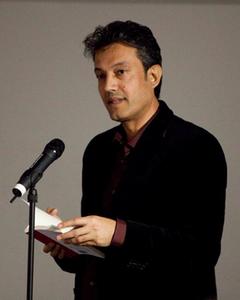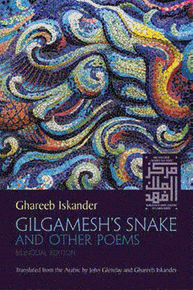
|
|
| photo: Michael Brydon | |
Poet Ghareeb Iskander was born in Baghdad. He studied Arabic literature at the University of Baghdad and is working toward a Ph.D. in poetry translation at the University of London (SOAS). His books include A Chariot of Illusion and Translating Sayyab into English. His new book is Gilgamesh's Snake and Other Poems, a bilingual collection published by Syracuse University Press; it won Arkansas University's Arabic Translation Award for 2015.
On your nightstand now:
As a Ph.D. candidate, I am reading Walt Whitman's Leaves of Grass, its Arabic translations and other related works (in Arabic and English) about this great book that shaped world poetry, including modern Arabic poetics.
Favorite book when you were a child:
Fairy Tales from the Arabian Nights (in Arabic). I don't remember if I read the whole book, but I read many fragments in different versions. What I definitely remember is the story of Sinbad. I also loved the cartoon movie very much.
Your top five authors:
I have many, but to answer this question I choose the anonymous writer (or writers) of The Epic of Gilgamesh (c. 2100 BC), an ancient poetic epic from Iraq. This epic is considered the earliest surviving literary written text. Al-Jāḥiẓ (c. 776-868 AD), the greatest Arab literary and scientific theorist, is my second-favorite author. He is considered to be the founder of the Arabic classical culture, and the father of the theory of evolution, which preceded Darwin by 1,000 years! My other top authors are T.S. Eliot, in his poetic and critical works; Adūnīs, the greatest living Arab writer; and Derek Walcott, whom I recently translated into Arabic.
Book you've faked reading:
I don't remember that I faked reading a book. But I guess I always pretend that I've finished Don Quixote by Cervantes. I bought Arabic and English versions of this book, but I haven't read them entirely. Maybe it is because I read so much about it from other writers. I often open the book and read certain pages here and there.  Book you're an evangelist for:
Book you're an evangelist for:
A Centenary Pessoa, edited by Eugenio Lisboa and L.C. Taylor, with a foreword by Octavio Paz. It is an excellent book about a great poet. But I'm also enthusiastic about it because of Paz's foreword "Unknown to Himself."
Book you've bought for the cover:
As I am in love with the Arabic calligraphy, I am going to buy The Cosmic Script: Sacred Geometry and the Science of Arabic Penmanship by Ahmed Moustafa and Stefan Sperl. It is not only a great study, but it has a very attractive cover with beautiful Arabic calligraphy.
Book you hid from your parents:
In the 1980s, I hid cultural books from my parents and others! Those books were considered political ones during Saddam's regime! Any book that didn't serve his purpose was forbidden.
Book that changed your life:
The book that changed my "poetic life" is Unshūdat al-Maṭar ("Hymn of the Rain") by the Iraqi poet Badr Shākir al-Sayyāb (1926-1964). I read this book when I was 15 years old.
Favorite line from a book:
"The more that vision expands, the narrower becomes the expression" --from Mawāqif wa Mukhāṭabāt (roughly translated as "Opinions and Correspondences") by al-Niffarī.
Five books you'll never part with:
Al-Ishārāt al-Ilāhiyya ("Divine Signals") by Abū Ḥayyān al-Tawḥīdī (Baghdad, c. 930-1023), the philosopher of litterateurs and the litterateur of philosophers, as he was described in the Islamic world in medieval times; Leaves of Grass by Walt Whitman; The Waste Land and Other Poems by T.S. Eliot; The Rosy Crucifixion (Nexus) by Henry Miller; and The Unbearable Lightness of Being by Milan Kundera.
Book you most want to read again for the first time:
The Time of the Assassins: A Study of Rimbaud by Henry Miller.

